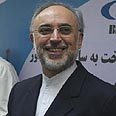
Iran, Egypt form closer ties
Iranian Foreign Minister Ali Akbar Salehi speaks with Egyptian counterpart, praises Egypt for role in Hamas-Fatah reconciliation. 'Palestinian unity is key to resistance against Zionity enemy,' he says
Iranian Foreign Minister Ali Akbar Salehi spoke with his Egyptian counterpart Nabil al-Araby on Monday evening for the first time since the uprising in Egypt.
Salehi said at press conference on Tuesday that cooperation with Egypt, especially in the political arena, "will help establish stability, security and peace in the region."
He also praised Egypt for its role in the reconciliation of Fatah and Hamas. "Palestinian unity is the key factor in empowering the resistance against the Zionist enemy," he said.
During their telephone chat, Salehi and Araby discussed developments in the Middle East, including the Fatah-Hamas unity agreement. The two ministers are expected to meet at the end of the month at the Nonaligned Movement meeting in Bally, Indonesia.
Dipolmatic relations
In Tuesday's press conference, which took place in Doha, Qatar, Salehi said that there isn't a reason that Iran's ties with Egypt should be weaker its ties with its other neighbors. "Currently we have good ties with all our neighbors, we have ambassadors and significant financial relationships," Salehi explained.
The two nations, which have maintained low-level diplomatic ties over the past three decades, have been growing closer since the transition of power in Egypt. It was reported recently that the Iranian government has already appointed an ambassador, although it is yet to become clear when the envoy will travel to Cairo.
The Iranian foreign minister also addressed the riots in Syria for the first time during the press conference, saying that "as long as the popular movement persists," Tehran will continue to support Syrian President Bashar al-Assad and his government's response to the "popular demands."
"According to the information that we have," he added, "There is a small group in Syria which receives outside support and is interested in creating unrest in the nation."
The United States accused Iran recently of aiding the Syrian authorities in suppressing the protests.
Dudi Cohen contributed to this report
- Follow Ynetnews on Facebook










